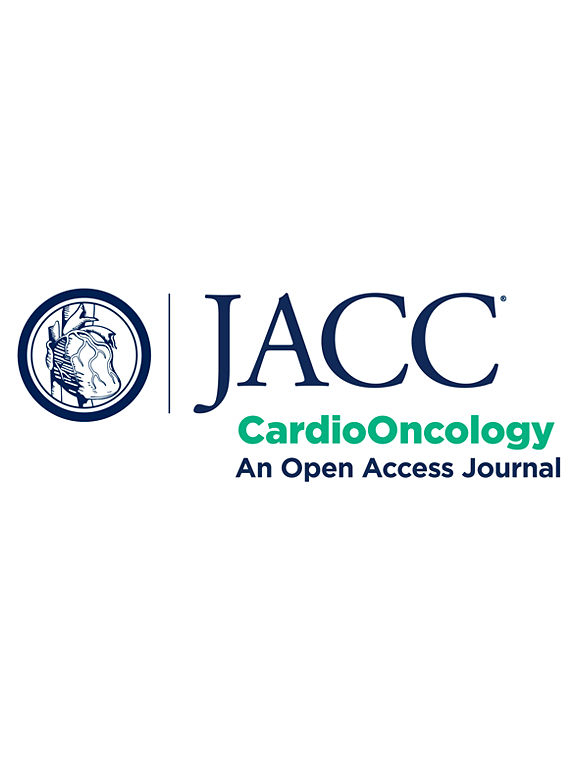心血管风险、健康指标和癌症预测:范围综述。
IF 12.8
1区 医学
Q1 CARDIAC & CARDIOVASCULAR SYSTEMS
引用次数: 0
摘要
背景:心血管疾病(CVD)和癌症是全球发病率和死亡率的主要原因。考虑到共同的风险因素,心血管疾病风险评分和心血管健康(CVH)指标可以预测癌症风险是合理的。目的:作者试图识别和总结检验CVD风险评分、CVH指标和癌症发生率之间关系的研究。方法:于2024年4月对Embase、PubMed、Scopus、Web of Science: Core 4个数据库进行系统检索,无语言和日期限制。5位审稿人(g.h.、j.k.、s.j.k.、m.h.、V.L.R.)使用covid - ence软件独立筛选记录,并从符合条件的前瞻性研究中提取数据(成人≥18岁;癌症发病率作为结果;心血管疾病风险评分或CVH指标作为暴露)。结果:在筛选的4165份记录中,包括13项研究(14项CVD或CVH指标)。量表间的异质性妨碍了meta分析。4项研究评估了CVD风险评分(如动脉粥样硬化性CVD), 10项研究报告了CVH指标(如美国心脏协会的Life's Simple 7)。样本量从1880年到342226年不等,中位随访从8.1年到29.6年不等。大多数包括所有类型的癌症(71.4%),包括乳腺癌、肺癌、结肠直肠癌和前列腺癌,癌症事件从387到11,643不等。心血管疾病风险评分越高,癌症风险发生率越高(hr: 1.16-3.71)。理想的CVH指标与风险降低相关(hr: 0.49-0.95)。结论:尽管心血管疾病风险指标和癌症类型存在异质性,但大多数研究表明,心血管疾病风险评分或CVH指标越差,患癌症的风险越高。未来的研究应侧重于特定的心血管疾病风险指标和癌症类型,以产生适合荟萃分析的证据。本文章由计算机程序翻译,如有差异,请以英文原文为准。
Cardiovascular Risk, Health Metrics, and Cancer Prediction
Background
Cardiovascular disease (CVD) and cancer are leading global causes of morbidity and mortality. Given the shared risk factors, it is plausible that CVD risk scores and cardiovascular health (CVH) metrics could predict cancer risk.
Objectives
The authors sought to identify and summarize studies examining the association between CVD risk scores, CVH metrics, and incident cancer.
Methods
A systematic search of 4 databases (Embase, PubMed, Scopus, Web of Science: Core) was conducted in April 2024 without language or date restrictions. Five reviewers (G.H., J.K., S.J.K., M.H., V.L.R.) independently screened records using Covidence software and extracted data from eligible prospective studies (adults aged ≥18 years; cancer incidence as outcome; CVD risk scores or CVH metrics as exposure).
Results
Of 4,165 records screened, 13 studies (14 CVD or CVH metrics) were included. Heterogeneity between scales precluded a meta-analysis. Four studies evaluated CVD risk scores (eg, atherosclerotic CVD) and 10 reported CVH metrics (eg, the American Heart Association’s Life’s Simple 7). Sample sizes ranged from 1,880 to 342,226, with median follow-up from 8.1 to 29.6 years. The majority included all types of cancer (71.4%), including breast, lung, colorectal, and prostate cancer types, with cancer events ranging from 387 to 11,643. Higher CVD risk scores were consistently associated with increased cancer risk incidence (HRs: 1.16-3.71). Ideal CVH metrics were associated with reduced risk (HRs: 0.49-0.95).
Conclusions
Despite heterogeneity in CVD risk metrics and cancer types, most studies suggested that worse CVD risk scores or CVH metrics predict greater cancer risk. Future studies should focus on specific CVD risk metrics and cancer types to produce evidence suitable for a meta-analysis.
求助全文
通过发布文献求助,成功后即可免费获取论文全文。
去求助
来源期刊

Jacc: Cardiooncology
Multiple-
CiteScore
12.50
自引率
6.30%
发文量
106
期刊介绍:
JACC: CardioOncology is a specialized journal that belongs to the esteemed Journal of the American College of Cardiology (JACC) family. Its purpose is to enhance cardiovascular care for cancer patients by publishing high-quality, innovative scientific research and sharing evidence-based knowledge.
The journal aims to revolutionize the field of cardio-oncology and actively involve and educate professionals in both cardiovascular and oncology fields. It covers a wide range of topics including pre-clinical, translational, and clinical research, as well as best practices in cardio-oncology. Key areas of focus include understanding disease mechanisms, utilizing in vitro and in vivo models, exploring novel and traditional therapeutics (across Phase I-IV trials), studying epidemiology, employing precision medicine, and investigating primary and secondary prevention.
Amyloidosis, cardiovascular risk factors, heart failure, and vascular disease are some examples of the disease states that are of particular interest to the journal. However, it welcomes research on other relevant conditions as well.
 求助内容:
求助内容: 应助结果提醒方式:
应助结果提醒方式:


